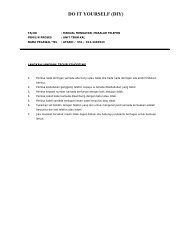chapter 6 - Malaysia Productivity Corporation ( MPC)
chapter 6 - Malaysia Productivity Corporation ( MPC)
chapter 6 - Malaysia Productivity Corporation ( MPC)
Create successful ePaper yourself
Turn your PDF publications into a flip-book with our unique Google optimized e-Paper software.
• Values created from upstream and<br />
downstream segments of energy and palm<br />
oil;<br />
• Driving wholesale, retail and tourism sector<br />
to enhance demand for goods and services;<br />
• Development of national and international<br />
distribution hubs in the country; and<br />
• Mass rapid transit and high speed rail<br />
projects to be rolled out under the Greater<br />
KL NKEA.<br />
Under the oil, gas and energy NKEA, EPP 4 aims to<br />
transform <strong>Malaysia</strong> into a regional oil storage and<br />
trading hub. With port locations on major shipping<br />
routes for crude oil and refined products, close<br />
proximity to Singapore, significant land availability<br />
and deepwater marine accessibility, <strong>Malaysia</strong> is<br />
well placed to have a significant presence in the<br />
oil storage and trading industry. Several large<br />
corporations and consortiums have committed<br />
to construct and expand on petroleum storage<br />
terminals during 2011. Some of the projects under<br />
construction are the Independent Deepwater<br />
Petroleum Terminal Project at Pengerang, Johor;<br />
Labuan oil storage terminal in Pulau Daat; and<br />
Tanjong Agas Oil and Gas and Logistics Industrial<br />
Park at Tanjung Agas, Pekan, Pahang. They are all at<br />
the initial phase of earthworks to be followed by<br />
construction of storage tanks in 2012.<br />
Strategies and Outlook<br />
The logistics services competitiveness should be<br />
enhanced to improve the position of <strong>Malaysia</strong> in<br />
the global economy. The existing institutional and<br />
regulatory framework can increase total export<br />
logistics costs and affect service quality. This will<br />
hinder the price competitiveness of <strong>Malaysia</strong>n<br />
exports, especially those destined for ASEAN’s<br />
CHAPTER 6<br />
main export market. Therefore, institutional<br />
and regulatory framework should be improved<br />
and user-friendly policies that reduce transport<br />
logistics costs and increase reliability should be<br />
introduced.<br />
With the growing importance of trade in services<br />
at a regional level, ASEAN started its own services<br />
liberalisation project to achieve greater and<br />
significant integration of logistics services in<br />
ASEAN. The liberalisation of the various logistics<br />
services are forecast to be completed by 2013.<br />
The liberalisation requires <strong>Malaysia</strong> to strengthen<br />
its logistics services and the capabilities of the<br />
logistics players and the multi-modal transport<br />
infrastructure in order to attract FDI in logistics and<br />
trade to <strong>Malaysia</strong> in future. <strong>Malaysia</strong> must continue<br />
to review and undertake progressive liberalisation<br />
of its logistic services. This will enhance the<br />
competitiveness of logistics services providers at<br />
regional and global levels.<br />
The excessive time taken for documentary process<br />
to be completed both for export and import can<br />
affect the competitiveness of <strong>Malaysia</strong>n exporters<br />
and importers in terms of response capability<br />
and costs. Each lost day because of administrative<br />
delay, increases firms inventory holding costs as<br />
well as results in trade reduction. The information<br />
and processes required by related authorities must<br />
be simplified and reduced. The logistics related<br />
formalities, procedures and documents must<br />
be reduced to an absolute minimum. Customs<br />
procedures should be improved and modernised<br />
to assist the flow of trade across borders rather than<br />
hindering such trade. PEMUDAH has been tasked<br />
with improving efficiency of cross-border logistics<br />
and resolve outstanding issues related to handling,<br />
forms processing and inspections at point of entry<br />
107



